Markets
Warren Buffett's Secret Portfolio Is Dumping Shares of three Supercharged Synthetic Intelligence (AI) Shares (No, Not Nvidia!)
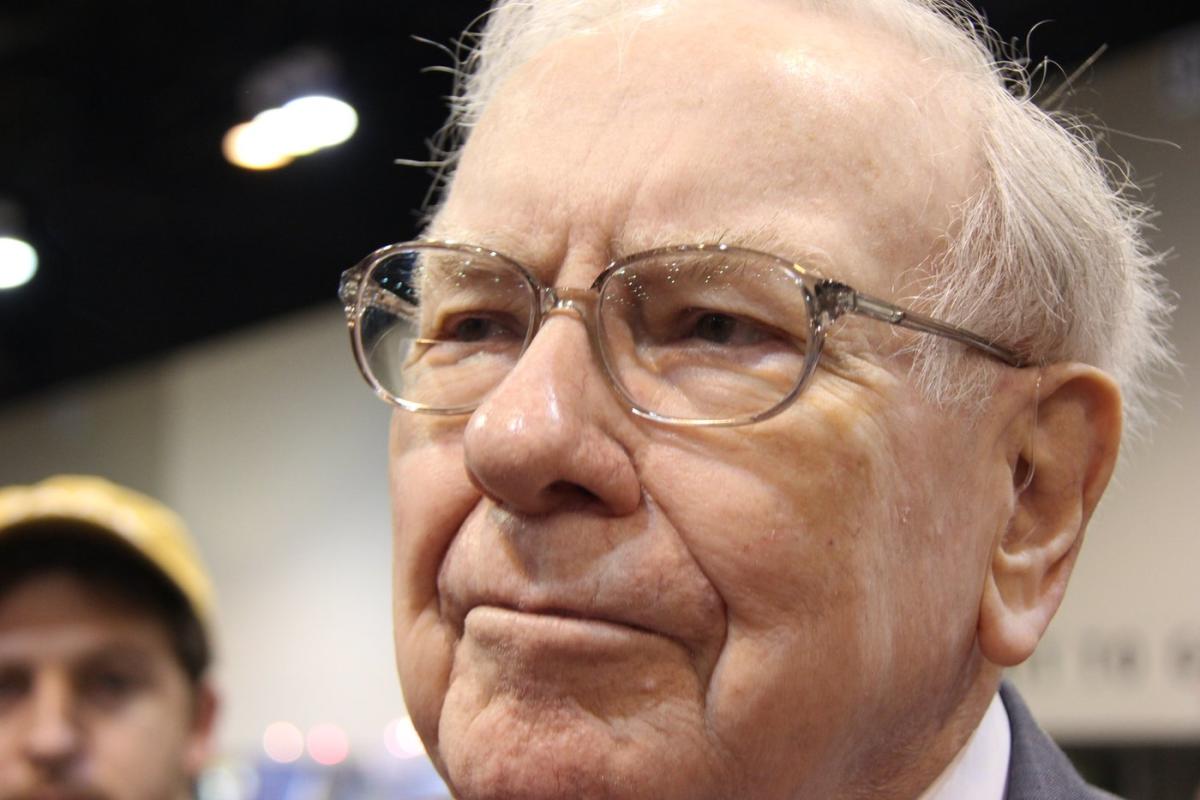
Few if any cash managers command the eye {of professional} and on a regular basis traders fairly like Berkshire Hathaway (NYSE: BRK.A)(NYSE: BRK.B) CEO Warren Buffett. Since changing into CEO within the mid-Sixties, he is overseen a cumulative return in his firm’s Class A shares (BRK.A) of greater than 5,500,000%, and .
Buyers typically wait on pins and needles for the quarterly launch of Berkshire’s . A 13F offers traders with a concise snapshot of what Wall Road’s brightest cash managers bought and bought within the newest quarter.
However this is one thing which may come as a little bit of a shock: Berkshire Hathaway’s 13F fails to inform the total story of what is beneath the corporate’s hood.
The Oracle of Omaha has a secret $602 million portfolio, and three AI shares are getting the heave-ho
In 1998, Berkshire Hathaway acquired Normal Re in an all-share deal valued at $22 billion. Though the crown jewel of this deal was Normal Re’s reinsurance operations, it additionally owned a specialty funding agency often called New England Asset Administration (NEAM). When the deal finalized in December 1998, Buffett turned the brand new proprietor of NEAM.
Institutional traders with a minimum of $100 million in property beneath administration are required to file a 13F with the Securities and Change Fee. As of the June-ended quarter, New England Asset Administration held $602 million in securities, and is subsequently required to reveal what shares have been purchased and bought.
Despite the fact that Warren Buffett does not handle the property held by NEAM the identical method he does for the 43-stock, $309 billion portfolio he oversees at Berkshire Hathaway, what NEAM owns is, finally, beneath the umbrella of Buffett’s firm. Thus, New England Asset Administration is, successfully, Warren Buffett’s $602 million secret portfolio.
Much like Buffett’s buying and selling exercise during the last two years, the advisors overseeing NEAM’s portfolio have predominantly been net-sellers of equities. What was as soon as a portfolio that boasted $6.3 billion of property, as of the March-ended quarter in 2022, now holds “simply” $602 million in securities, as of June 30, 2024.
Most notably, Buffett’s secret portfolio has been dumping its holdings in three high-growth synthetic intelligence (AI) shares — and no, Nvidia is not certainly one of them.
Broadcom
The primary high-flying AI inventory that is being given the heave-ho by the asset managers of Buffett’s hidden portfolio is networking options specialist Broadcom (NASDAQ: AVGO). New England Asset Administration diminished its stake within the firm by 19% within the June-ended quarter.
There is no denying that Broadcom has been a transparent beneficiary of the rise of AI. Its networking options, that are designed to cut back tail latency and maximize the computing potential of AI-graphics processing models (GPUs), have shortly grow to be staples in enterprise knowledge facilities tasked with working generative AI options and coaching giant language fashions.
However what traders, together with these at NEAM, is likely to be overlooking is that Broadcom is rather more than simply an AI networking options supplier. As an illustration, it is one of many main wi-fi chip and accent suppliers for next-generation smartphones. Wi-fi carriers upgrading their networks to help 5G obtain speeds has led to a sustained system substitute cycle that is clearly benefiting Broadcom.
Broadcom can also be a key provider of optical elements utilized in automated industrial gear, networking options for next-gen autos, and cybersecurity options.
I would be remiss if I did not additionally point out that Broadcom often leans on acquisitions to develop its product and repair ecosystem and enhance cross-selling alternatives. Its newest acquisition — a $69 billion deal to purchase cloud-based virtualization software program firm VMware, which closed final 12 months — ought to assist it grow to be a key participant in non-public and hybrid enterprise clouds.
The one logical purpose to promote shares of Broadcom is if you happen to imagine the AI bubble goes to burst — and there are many indicators to recommend this might occur. Whereas an AI bubble-bursting occasion would, undoubtedly, harm Broadcom’s inventory, its enterprise is well-diversified and in a position to navigate no matter is thrown its method.
Microsoft
A second AI inventory that the cash managers of Warren Buffett’s $602 million secret portfolio seem like souring on is the second-largest publicly traded firm, Microsoft (NASDAQ: MSFT). Throughout the second quarter, a hair over 20% of NEAM’s stake in Microsoft was proven the door.
Microsoft is integrating AI into quite a lot of its working segments. This consists of providing generative AI options to its Azure shoppers. Azure is the world’s No. 2 cloud infrastructure service platform and has constantly been Microsoft’s fastest-growing working phase. With most companies nonetheless early of their cloud-spending cycle, Azure can probably be counted on for sustained double-digit gross sales progress.
Microsoft has additionally been inorganically investing within the AI revolution. As an illustration, it is a core investor in OpenAI, the corporate behind standard chatbot ChatGPT. OpenAI assisted Microsoft in relaunching its Bing search engine and Edge browser with AI capabilities.
Additional, Microsoft and BlackRock introduced plans final week to launch a $30 billion fund that’ll spend money on varied AI infrastructure. Microsoft is flush with money, and its administration workforce has demonstrated a willingness to develop its product and repair ecosystem by placing it to work.
So, why promote a fifth of NEAM’s Microsoft stake if the corporate is firing on all cylinders? The reply in all probability lies with Microsoft’s valuation.
As of the closing bell on Sept. 17, Microsoft was valued at practically 32 instances consensus earnings per share for fiscal 2026 (ended June 30, 2026). That is about 7% greater than its common ahead price-to-earnings (P/E) a number of over the trailing-five-year interval, and is a considerably aggressive earnings a number of given how dear the inventory market is correct now.
Alphabet
The third synthetic intelligence inventory in Buffett’s $602 million secret portfolio that is been despatched to the chopping block is Google guardian Alphabet (NASDAQ: GOOGL)(NASDAQ: GOOG). Particularly, the managers at NEAM bought practically 28% of their fund’s stake in Alphabet’s Class A shares (GOOGL) within the second quarter.
Much like Microsoft, Alphabet ought to see a number of its AI-related progress stem from generative AI resolution integration with its cloud infrastructure service platform.
Google Cloud is the world’s No. 3 cloud infrastructure service platform by whole spending, and it turned worthwhile on a recurring foundation final 12 months. Because the margins related to cloud companies are normally a lot greater than promoting margins, Google Cloud has an opportunity to be Alphabet’s main driver of working money circulation by the flip of the last decade.
In the intervening time, Alphabet’s foundational working phase continues to be its Google search engine. For greater than 9 years, Google has accounted for at least 90% of the month-to-month share of worldwide web search. This makes it the clear go-to for advertisers and affords Alphabet phenomenal ad-pricing energy.
Moreover, Alphabet is sitting on virtually $111 billion in money, money equivalents, and marketable securities. Much like Microsoft, Alphabet’s stability sheet provides it a stage of economic flexibility that few firms can match.
On condition that Alphabet is traditionally low-cost, NEAM’s promoting of Alphabet inventory is a little bit of a head-scratcher. The very best guesses as to why Buffett’s secret portfolio is dumping shares of Alphabet is the rising probability of the AI bubble bursting and shares, as an entire, being costly.
Do you have to make investments $1,000 in Broadcom proper now?
Before you purchase inventory in Broadcom, contemplate this:
The Motley Idiot Inventory Advisor analyst workforce simply recognized what they imagine are the for traders to purchase now… and Broadcom wasn’t certainly one of them. The ten shares that made the lower might produce monster returns within the coming years.
Contemplate when Nvidia made this listing on April 15, 2005… if you happen to invested $1,000 on the time of our suggestion, you’d have $710,860!*
Inventory Advisor offers traders with an easy-to-follow blueprint for fulfillment, together with steering on constructing a portfolio, common updates from analysts, and two new inventory picks every month. The Inventory Advisor service has greater than quadrupled the return of S&P 500 since 2002*.
*Inventory Advisor returns as of September 16, 2024
Suzanne Frey, an govt at Alphabet, is a member of The Motley Idiot’s board of administrators. has positions in Alphabet. The Motley Idiot has positions in and recommends Alphabet, Berkshire Hathaway, Microsoft, and Nvidia. The Motley Idiot recommends Broadcom and recommends the next choices: lengthy January 2026 $395 calls on Microsoft and brief January 2026 $405 calls on Microsoft. The Motley Idiot has a .
was initially revealed by The Motley Idiot
Markets
Qualcomm's potential Intel buyout might elevate antitrust, foundry considerations
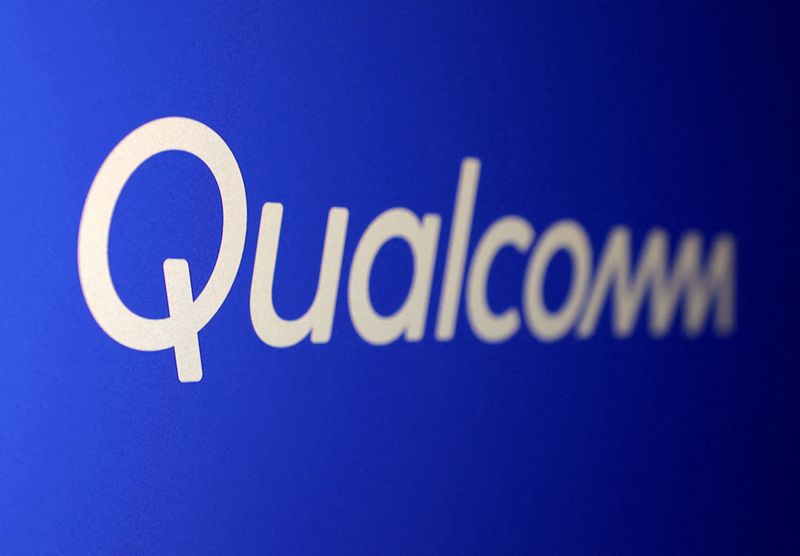
By Aditya Soni and Yuvraj Malik
(Reuters) – A possible deal to purchase Intel might speed up Qualcomm’s diversification however will burden the smartphone chipmaker with a loss-making semiconductor manufacturing unit that it could battle to show round or promote, analysts stated.
A buyout will even face powerful antitrust scrutiny globally as it could unite two essential chip companies in what could be the sector’s largest ever deal, making a behemoth with a powerful share of the smartphone, private laptop and server markets.
Shares of Intel rose 3% earlier than the bell on Monday, after media experiences late on Friday about Qualcomm’s early-stage strategy for the struggling chipmaker. Qualcomm’s shares had been decrease.
“The rumored deal between Qualcomm and Intel is intriguing on many ranges and, from a pure product perspective, makes a sure diploma of sense as they’ve numerous complementary product traces,” stated TECHnalysis Analysis founder Bob O’Donnell.
“The fact of it truly occurring, nevertheless, could be very low. Plus, it’s unlikely Qualcomm would need all of Intel and making an attempt to interrupt aside the product enterprise from the foundry enterprise proper now simply wouldn’t be doable,” he stated.
As soon as the dominant pressure within the semiconductor business, five-decade-old Intel is going through one in every of its worst durations as losses mount on the contract manufacturing unit it’s constructing out in hopes of difficult TSMC.
Intel’s market worth has fallen under $100 billion for the primary time in three many years as the corporate has missed out on the generative AI growth after passing on an OpenAI funding.
As of final shut, its market capitalization was lower than half that of potential suitor Qualcomm, which has a worth of about $190 billion.
Contemplating Qualcomm had round $7.77 billion in money and money equivalents as of June 23, analysts count on the deal will principally be funded by way of inventory and could be extremely dilutive for Qualcomm’s buyers, probably elevating some apprehension.
Qualcomm, which additionally provides to Apple, has quickened its efforts to broaden past its mainstay smartphone enterprise with chips for industries together with automotive and PCs below CEO Cristiano Amon. However it nonetheless stays overly reliant on the cell market, which has struggled lately because of the post-pandemic demand droop.
Amon is personally concerned within the Intel negotiations and has been analyzing varied choices for a deal for the corporate, sources have informed Reuters.
This isn’t the primary time Qualcomm is pursing a big acquisition. It had provided to purchase rival NXP Semiconductors for $44 billion in 2016, however deserted the bid two years later after failing to safe a nod from Chinese language regulators.
FOUNDRY CONUNDRUM
Whereas Intel designs and producers its chips that energy private computer systems and information facilities, Qualcomm has by no means operated a chip manufacturing unit. It makes use of contract producers resembling TSMC and designs and different know-how provided by Arm Holdings.
Qualcomm lacks the expertise wanted to ramp up Intel’s fledgling foundry enterprise, which just lately named Amazon.com as its first main buyer, in accordance with analysts.
“We have no idea why Qualcomm could be a greater proprietor for these property,” stated Stacy Rasgon of Bernstein.
“We don’t actually see a situation with out them both; we don’t assume anybody else would actually need to run them and consider scrapping them is unlikely to be politically viable,” he added.
Intel’s foundry enterprise is seen as essential to Washington’s objective of rising home chip manufacturing. The corporate has secured about $19.5 billion in federal grants and loans below the CHIPS Act to construct and broaden factories throughout 4 U.S. states.
Some analysts stated Intel would like outdoors investments as an alternative of a sale, pointing to a latest transfer to make the foundry enterprise extra unbiased.
Lusso’s Information Information reported over the weekend that Apollo World Administration, already a accomplice in Intel’s Eire facility, has provided an funding of as a lot as $5 billion within the firm.
Qualcomm might additionally determine to purchase elements of Intel’s enterprise, as an alternative of your entire firm. Reuters had reported earlier this month that it had explicit curiosity in Intel’s PC design unit.
(Reporting by Aditya Soni and Yuvraj Malik in Bengaluru; extra reporting by Juby Babu in Mexico Metropolis and Seher Dareen and Utkarsh Shetti in Bengaluru; Modifying by Sriraj Kalluvila)
Markets
Fed's Bostic says financial system returning to regular, coverage also needs to 'normalize'

Raphael Bostic, President of the Atlanta Federal Reserve, believes the U.S. financial system is on a sustainable path towards value stability, justifying a discount within the federal funds fee.
In remarks ready for the European Economics and Monetary Centre, Bostic defined why he supported a 50-basis-point lower within the federal funds fee on the September 2024 Federal Open Market Committee (FOMC) assembly.
“Progress on inflation and the cooling of the labor market have emerged rather more rapidly than I imagined in the beginning of the summer time,” stated Bostic.
“The US financial system is certainly sustainably on the trail again to cost stability,” Bostic added, citing each the private consumption expenditures (PCE) and client value index (CPI) inflation measures, which have dropped to 2.5%.
He emphasised that value pressures, notably within the housing market, have slowed.
The choice to scale back charges, Bostic defined, is geared toward recalibrating financial coverage to mirror a extra balanced threat between value stability and most employment.
“I now see the 2 units of dangers as rather more balanced,” he stated, highlighting that inflation and employment at the moment are nearing ranges which may be thought-about regular.
“On this second, I envision normalizing financial coverage prior to I assumed could be acceptable even a couple of months in the past,” acknowledged Bostic.
Though some anticipated a smaller fee lower, Bostic famous that the labor market’s uncertainty warranted a bolder transfer. Nonetheless, he harassed that the discount “doesn’t lock in a cadence for additional strikes.”
As an alternative, future coverage changes will stay data-dependent, considering the evolving financial panorama.
Bostic concluded that the Fed’s restrictive financial stance was now not essential and that the shift towards a extra impartial coverage fee would assist keep away from undue harm to the labor market whereas persevering with to advertise value stability.
“It’s time to normalize coverage in pursuit of the Committee’s twin mandate of value stability and most employment,” he stated.
Markets
Prediction: This Main Synthetic Intelligence (AI) Inventory May Compete With Nvidia within the Not-Too-Distant Future
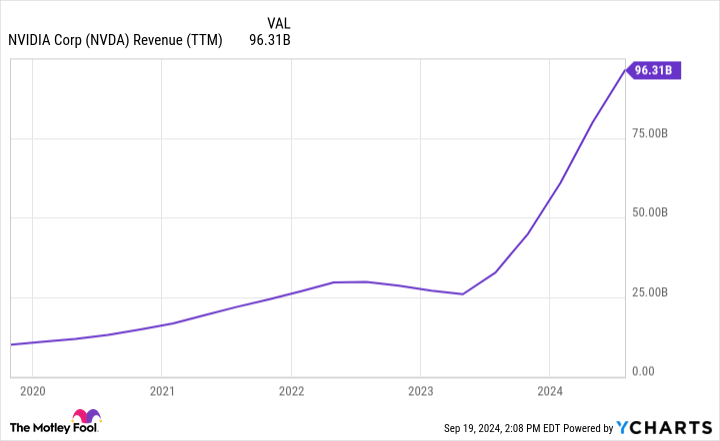
What occurs when an organization’s largest prospects develop into fierce rivals? Think about that you simply personal the biggest chocolate chip firm within the land. You promote to all the biggest grocery chains as a result of you will have the most effective recipe. However each day, these shops pour cash into discovering the next-best recipe. In the event that they create it, it might be a recipe for catastrophe (pardon the pun).
That is Nvidia‘s actuality now. Firms like Microsoft, Alphabet (NASDAQ: GOOG)(NASDAQ: GOOGL), Meta Platforms, and Amazon are spending billions on Nvidia GPUs whereas additionally spending billions creating competing merchandise. The important thing for Nvidia is to remain one step forward. Nevertheless it will not be simple with such deep-pocketed rivals.
Alphabet is severe competitors
As proven under, the 4 huge tech firms talked about above reportedly account for practically 40% of Nvidia’s income, which exploded to $96 billion over the previous 12 months.
Of this, 85% comes from Nvidia’s information middle division. No matter firm can encroach on Nvidia’s huge market share of reportedly 70% to 95% in synthetic intelligence (AI) chips will profit in two methods: elevated revenue and decreased bills. In spite of everything, a lot of that enormous ramp in Nvidia’s income, depicted above, comes from different large tech firms’ pockets.
Nvidia is main resulting from its groundbreaking H100 GPU, which delivers unparalleled efficiency. These items are crucial for information facilities, giant language fashions, and generative AI, so Nvidia cannot sustain with demand and the margins are gigantic.
Alphabet is creating and bettering its competing AI product, the Tensor Processing Unit (TPU). It launched the sixth-generation TPU, Trillium, earlier this yr. With 5 instances extra velocity and 67% extra vitality effectivity, sixth-gen Trillium is a substantial leap over model 5.
Trillium would not compete straight on the open market with Nvidia. As a substitute, prospects lease house on Google Cloud, permitting Alphabet a broader buyer base. The power to lease house shall be intense competitors for Nvidia as firms can select to lease fairly than make capital investments. And, after all, Alphabet makes use of it internally.
Is Alphabet inventory a purchase now?
Alphabet can pour capital into AI initiatives as a result of it’s massively worthwhile and generates huge money circulation from its core promoting (Google Search and YouTube) and Google Cloud segments. These segments generated $84 billion in gross sales final quarter, a 14% year-over-year enhance that got here with $27 billion in working money circulation.
Additionally spectacular is that the working margin for Google Cloud elevated from 5% to 11% yr over yr. The rise in margin is a transparent indication of elevated effectivity and rising demand. As you possibly can see under, Google Cloud’s progress has been outstanding lately.
Even after rising practically fourfold since 2020, AI will enhance Google Cloud’s gross sales. For Alphabet, investments in AI, Google Cloud, and generative chatbots that rival ChatGPT, like Gemini, are essential to the long-term path.
Microsoft Bing is difficult Google Search by harnessing ChatGPT by its billion-dollar funding in its creator, OpenAI. Plus, generative AI could encroach on the search market. Nonetheless, there isn’t any have to sound an alarm but; Google Search grew 14% final quarter to $49 billion in income and stays far and away the market chief.
Alphabet inventory appears to be like like a cut price in a market the place many tech shares are buying and selling nicely above historic valuations. As proven under, Microsoft trades 14% above its five-year common price-to-earnings (P/E) ratio, whereas Alphabet trades 12% under.
The historic undervaluation, high quality core enterprise, and potential to compete for a part of Nvidia’s market dominance make Alphabet inventory an clever purchase for tech buyers and people searching for firms.
Do you have to make investments $1,000 in Alphabet proper now?
Before you purchase inventory in Alphabet, contemplate this:
The Motley Idiot Inventory Advisor analyst workforce simply recognized what they consider are the for buyers to purchase now… and Alphabet wasn’t certainly one of them. The ten shares that made the reduce might produce monster returns within the coming years.
Contemplate when Nvidia made this record on April 15, 2005… should you invested $1,000 on the time of our advice, you’d have $710,860!*
Inventory Advisor supplies buyers with an easy-to-follow blueprint for achievement, together with steerage on constructing a portfolio, common updates from analysts, and two new inventory picks every month. The Inventory Advisor service has greater than quadrupled the return of S&P 500 since 2002*.
*Inventory Advisor returns as of September 16, 2024
John Mackey, former CEO of Entire Meals Market, an Amazon subsidiary, is a member of The Motley Idiot’s board of administrators. Suzanne Frey, an govt at Alphabet, is a member of The Motley Idiot’s board of administrators. Randi Zuckerberg, a former director of market growth and spokeswoman for Fb and sister to Meta Platforms CEO Mark Zuckerberg, is a member of The Motley Idiot’s board of administrators. has positions in Amazon. The Motley Idiot has positions in and recommends Alphabet, Amazon, Meta Platforms, Microsoft, and Nvidia. The Motley Idiot recommends the next choices: lengthy January 2026 $395 calls on Microsoft and brief January 2026 $405 calls on Microsoft. The Motley Idiot has a .
was initially revealed by The Motley Idiot
-

 Markets3 months ago
Markets3 months agoInventory market in the present day: US futures slip as Micron slides, with information on deck
-

 Markets3 months ago
Markets3 months agoFutures dip as Micron drags down chip shares forward of financial information
-

 Markets3 months ago
Markets3 months agoApogee shares rise almost 4% on upbeat steering and earnings beat
-
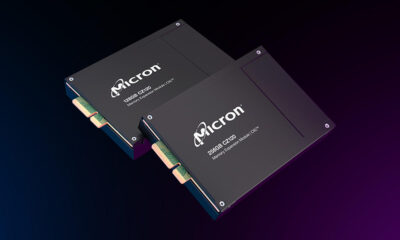
 Markets3 months ago
Markets3 months agoWhy Is Micron Inventory Down After a Double Earnings Beat?
-
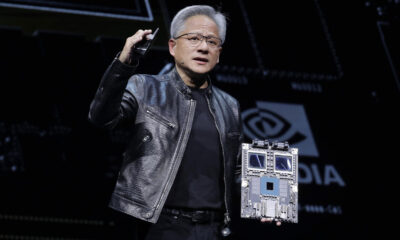
 Markets3 months ago
Markets3 months agoWhy Nvidia inventory is now in treacherous waters: Morning Transient
-

 Markets3 months ago
Markets3 months agoHungary central financial institution tells lenders to reimburse purchasers after Apple glitch
-
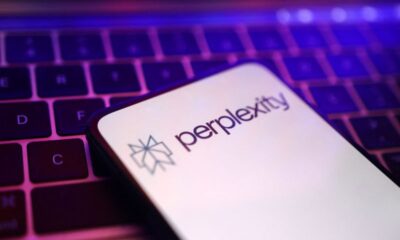
 Markets3 months ago
Markets3 months agoSoftBank to spend money on search startup Perplexity AI at $3 billion valuation, Bloomberg experiences
-

 Markets3 months ago
Markets3 months agoMeet the 1 S&P 500 Inventory That's Outperforming Nvidia So Far in 2024
-
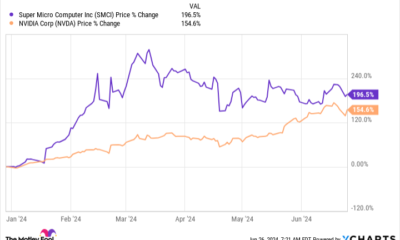
 Markets3 months ago
Markets3 months agoDown 30% From Its All-Time Excessive, Ought to You Purchase Synthetic Intelligence (AI) Famous person Tremendous Micro Pc?
-

 Markets3 months ago
Markets3 months agoIf You'd Invested $1,000 in Starbucks Inventory 20 Years In the past, Right here's How A lot You'd Have Immediately
-

 Markets3 months ago
Markets3 months agoPrediction: This Transfer From Nvidia within the Second Half Will Be A lot Greater Than the Inventory Break up
























